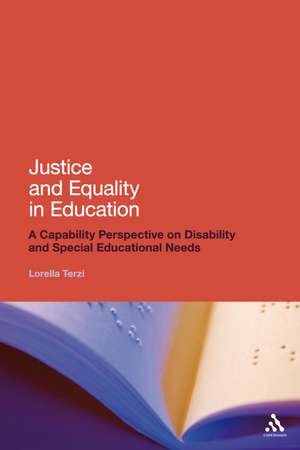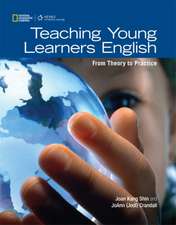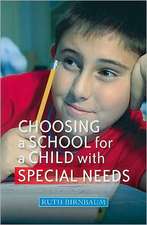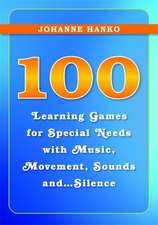Justice and Equality in Education: A Capability Perspective on Disability and Special Educational Needs
Autor Dr Lorella Terzien Limba Engleză Paperback – 9 mar 2010
| Toate formatele și edițiile | Preț | Express |
|---|---|---|
| Paperback (1) | 303.62 lei 43-57 zile | |
| Bloomsbury Publishing – 9 mar 2010 | 303.62 lei 43-57 zile | |
| Hardback (1) | 947.94 lei 43-57 zile | |
| Bloomsbury Publishing – 13 mar 2008 | 947.94 lei 43-57 zile |
Preț: 303.62 lei
Preț vechi: 332.36 lei
-9% Nou
Puncte Express: 455
Preț estimativ în valută:
58.10€ • 60.82$ • 48.07£
58.10€ • 60.82$ • 48.07£
Carte tipărită la comandă
Livrare economică 07-21 aprilie
Preluare comenzi: 021 569.72.76
Specificații
ISBN-13: 9781441108319
ISBN-10: 1441108319
Pagini: 226
Dimensiuni: 156 x 234 x 18 mm
Greutate: 0.3 kg
Editura: Bloomsbury Publishing
Colecția Continuum
Locul publicării:London, United Kingdom
ISBN-10: 1441108319
Pagini: 226
Dimensiuni: 156 x 234 x 18 mm
Greutate: 0.3 kg
Editura: Bloomsbury Publishing
Colecția Continuum
Locul publicării:London, United Kingdom
Caracteristici
Offers a philosophical approach along with practical guidance concerning the education of children with disabilities
Cuprins
Foreword by Professor Harry BrighouseIntroduction1. Inclusive and Special Education: Incoherence in Practice and Dilemmas in Theory2. The Social Model of Disability: A Philosophical Critique3. The Social Model of Disability and Inclusive Education4. The Capability Approach: Re-examing Impairment and Disability5. Beyond the Dilemma of Difference: The Capability Perspective on Disability and Special Educational Needs6. Capability Equality and the Egalitarian Debate7. Justice and Equality in Education: Towards a Principled Framework8. Objections to the Principled Framework for Educational Equality: A ResponseConclusionBibliographyIndex
Recenzii
'This excellent book is an incisive intervention and engagement with a number of pressing contemporary debates in education ... [R]emarkable both for its lucidity and the ways in which it invites further exploration ... this is a compelling book that deserves wide readership.' - Journal of Human Development and Capabilities
'Terzi's book offers a philosophically rich elucidation and defence of the principle of educational equality, but also practical guidance concerning the education of children with disabilities....Anyone interested in political philosophy as it applies to education or in the philosophy of education more generally will want to read the following pages. Anyone who wants to think carefully about inclusion, disability rights, or the sociology of disability, has to.' Taken from the foreword by Harry Brighouse, Professor of Philosophy and Affiliate Philosopher of Educational Policy Studies at University of Wisconsin, Madison, USA
'Although this book is challenging, it is a worthwhile read...all teachers need to engage with the concepts explored in this book...if we teachers are to be perceived as professionals rather than mere technicians implementing the ideas of others, we need to have a principled foundation for the teaching acts we engage in our work. Terzi's Justice and Equality in Education offers such a foundation.' British Journal of Special Education
'An important and timely book. It presents a new framework for understanding justice and equality in education, and applies this to an area that cries out for political, ethical and conceptual attention: the education of children with disabilities and special educational needs ('special education'). It is a scholarly work of political philosophy, referencing a dazzling display of argumentation and counter-argumentation. You can be sure that academics from a variety of disciplines (political theory, education, sociology, philosophy, to name by a few) will pore over it for many years to come.' European Journal of Special Needs Education
'A comprehensive account of the relevance of the capability approach to the educational rights and needs of those with disabilities and special educational needs...in developing her argument for the right of those with disabilities to be educated she does not simply presume the importance of education but justifies it. Thus, although this book focuses on disability, her interrogation of what it is to be educated makes her work relevant to educational impoverishment more generally.' Power and Education
'Terzi's book offers a philosophically rich elucidation and defence of the principle of educational equality, but also practical guidance concerning the education of children with disabilities....Anyone interested in political philosophy as it applies to education or in the philosophy of education more generally will want to read the following pages. Anyone who wants to think carefully about inclusion, disability rights, or the sociology of disability, has to.' Taken from the foreword by Harry Brighouse, Professor of Philosophy and Affiliate Philosopher of Educational Policy Studies at University of Wisconsin, Madison, USA
'Although this book is challenging, it is a worthwhile read...all teachers need to engage with the concepts explored in this book...if we teachers are to be perceived as professionals rather than mere technicians implementing the ideas of others, we need to have a principled foundation for the teaching acts we engage in our work. Terzi's Justice and Equality in Education offers such a foundation.' British Journal of Special Education
'An important and timely book. It presents a new framework for understanding justice and equality in education, and applies this to an area that cries out for political, ethical and conceptual attention: the education of children with disabilities and special educational needs ('special education'). It is a scholarly work of political philosophy, referencing a dazzling display of argumentation and counter-argumentation. You can be sure that academics from a variety of disciplines (political theory, education, sociology, philosophy, to name by a few) will pore over it for many years to come.' European Journal of Special Needs Education
'A comprehensive account of the relevance of the capability approach to the educational rights and needs of those with disabilities and special educational needs...in developing her argument for the right of those with disabilities to be educated she does not simply presume the importance of education but justifies it. Thus, although this book focuses on disability, her interrogation of what it is to be educated makes her work relevant to educational impoverishment more generally.' Power and Education



![English for Information Technology 2 Course Book (Vocational English Series) [With CDROM]: Texts, Production, Context](https://i0.books-express.ro/bt/9781408269909/english-for-information-technology-2-course-book-vocational-english-series-with-cdrom.jpg)





